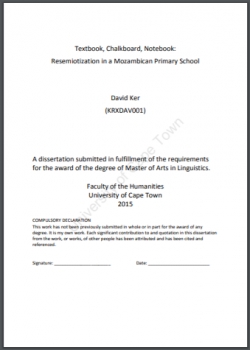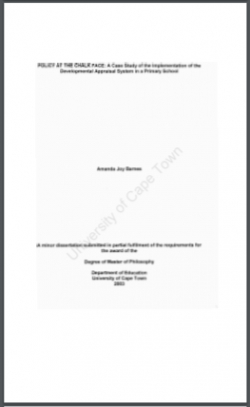Textbook, chalkboard, notebook : resemiotization in a Mozambican primary school

Type
Thesis
Authors
Category
ECCE, Foundation, Intermediate
[ Browse Items ]
Publication Year
2015
Publisher
University of Cape Town, Linguistics, Cape Town, South Africa
URL
[ private ]
Pages
203 p.
Subject
Early childhood education, Primary education, Foundation Phase, Intermediate Phase, Learners, Teachers, Educators, Writing practices, Resemiotization, Mimesis, Portuguese language, Mozambique
Tags
Abstract
This ethnographic, sociolinguistic study describes the writing practices of teachers and students in a Portuguese-language primary school in Mozambique. In the classroom, teachers and students engage in a text-chain ritual in which the teacher copies a text from the textbook onto the chalkboard, which is then copied by the students into their notebooks. Using the theoretical framework of social semiotics, this study situates classroom writing within a range of multimodal practices which scaffold the written texts. This study employs the notion of resemiotization in order to describe the ways in which signs are transformed as they move between different sites of display. This resemiotization is framed by educational ritual with the language of instruction, Portuguese, being a second language (hereafter ‘L2’) to most of the students. Because of the linguistic constraints of the L2, rote- copying practices predominate in the classroom. Copying allows lessons to move forward despite the comprehension difficulties of the students. The text-chain is shown to be simultaneously reductive and expansive. Subsequent links tend to be reduced representations of their originating signs even while these signs serve as the basis for expansive multimodal ensembles which include speech, drawing and gesture, as well as the use of the students’ home language. This study employs the notion of mimesis in order to account for the ways in which the resemiotization observed in the classroom is both imitative and creative. Each instance of writing imitates a previous link in the text-chain but also shows evidence of teachers and students creatively shaping their texts. In order to study these writing practices, more than 40 classroom lessons were observed during two research trips to Tete, Mozambique. This study used observation and photographic data-records to trace the movement of texts over the course of a lesson. Photographs of the chalkboard were taken as the chalkboard text grew and changed. In each classroom, six students were selected and their notebook writing photographed. The photographing of the chalkboard and notebooks allowed for the comparison of these texts as they were produced in the classroom. Additionally, teachers and educators were interviewed to provide insight on classroom writing practices. During these interviews, teachers were asked to describe their schooling experience and compare it with schooling today. Teachers and educators also provided background information on bilingual education and their use of a technique known as currículo local, ‘local curriculum’, in which teachers use local language and culture to create connections between classroom knowledge and students’ existing knowledge. This thesis draws attention to the complexity of writing practices in L2 classrooms. Writing is shown to be a term that covers a wide range of practices including rote copying, drawing, doodling, and pseudo-writing. These writing practices take place in an environment marked by linguistic and semiotic diversity. This thesis expands the use of the term resemiotization by looking in detail at the material and social processes that occur in the classroom. Additionally, this thesis draws attention to ritual as an organizing principle for resemiotizing processes in which institutional forces and authorized language influence and shape local practices. The use of the notion of mimesis allows this analysis to account for the ways in which resemiotization involves both imitation and creativity in a text-chain that exhibits signs of semiotic reduction while simultaneously facilitating instances of profuse multimodal communication.
Description
Thesis (MA)--University of Cape Town
Number of Copies
1
| Library | Accession No | Call No | Copy No | Edition | Location | Availability |
|---|---|---|---|---|---|---|
| Main | 807 | 1 | Yes |


